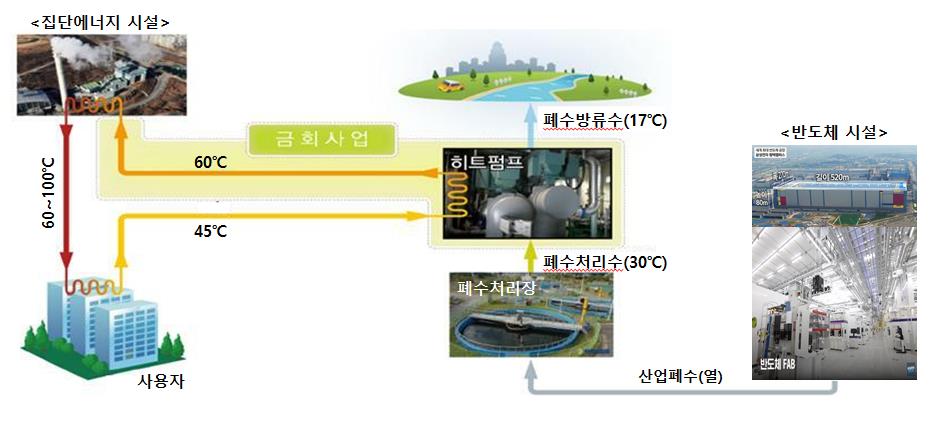제조 공정에서 많은 에너지를 소모하는 반도체 산업에서 에너지 순환 체계를 강화하는 양해각서가 체결됐다. 삼성전자 반도체 공정 중 버려지는 열 에너지를 지역난방에 이용하는 방안이 마련돼 저탄소 친환경 정책에 기여할 것으로 기대를 모았다.

▲산업폐열을 활용한 지역난방 회수열 승온(자료:산업부)
반도체 산업 에너지 이용 효율화 MOU
제조 공정에서 많은 에너지를 소모하는 반도체 산업에서 에너지 순환 체계를 강화하는 양해각서가 체결됐다. 삼성전자 반도체 공정 중 버려지는 열 에너지를 지역난방에 이용하는 방안이 마련돼 저탄소 친환경 정책에 기여할 것으로 기대를 모았다.
한국지역난방공사(이하 한난)와 삼성전자가 12일 산업통상자원부(이하 산업부) 임석하에 반도체·집단에너지 산업 간 에너지 이용 효율화 및 저탄소화 협약을 삼성전자 화성캠퍼스에서 체결했다.
기존에는 삼성전자의 반도체 생산과정에서 발생하는 온수 일부가 추가적인 쓰임 없이 버려져 왔다. 이를 한난이 지역난방 및 산업 공정을 위한 열을 만드는 데 활용한다는 것이다.
한난은 삼성전자 반도체 공장에서 발생되는 폐열방류수를 히트펌프 이용해 지역난방 열원으로 활용하는 신기술 적용 시범 사업 연내 착수할 계획이다. 장기적으로는 평택 및 용인 반도체 클러스터 등 반도체 산업시설과 배후도시의 안정적 열공급 위한 열원의 다양화와 저탄소화 협력·추진할 것으로 전망했다.
반도체 산업폐열의 활용을 통해 양사는 반도체 산업과 집단에너지 부문의 온실가스 배출을 줄이고, 열 생산에 소요되는 액화천연가스(LNG) 비용을 절감할 수 있을 것으로 기대했다.
최남호 2차관은 “이번 협력사업은 에너지 효율을 높이고 온실가스를 감축하는 의미가 있다”며, “정부도 데이터 기반 열거래 확산, 열회수 기술 연구개발 및 사업화 지원 등 정책적 지원을 아끼지 않을 것”이라고 밝혔다.
한편, 산업부는 에너지 절약시설 설치 융자사업, 온실가스 감축설비 보조금 지원사업, 산업단지 에너지자급 인프라 구축 사업 등을 통해 열 회수 및 이용설비 등에 대한 투자를 지원하고 있다. 또한 수소 발전 입찰시장에서 부생열 활용 시 가점 부여, 에너지 관리기준 운영 등을 통해 열거래 및 활용도가 제고될 수 있도록 하고 있다.
